Not All Autobiographical Elements Are Equal

Graphic by Angelie Zaslavsky
Ilan Mochari’s novel, “Zinsky the Obscure” (Fomite Press), is now available. He is Chief Writer for The Build Network and a contributor to Cognoscenti, the online magazine for Boston’s NPR News Station. His blog posts are featured on The Arty Semite courtesy of the Jewish Book Council and My Jewish Learning’s Author Blog Series. For more information on the series, please visit:
I get this question all the time: How autobiographical is your novel?
The book’s style, setting, and protagonist invite the question: It’s a first-person coming-of-age debut. It takes place largely in New York and Boston, where I’ve spent most of my life. And the main character — the Zinsky of the title — is my age.
But my honest answer is this: “The life I’ve lived is different from the tale I spin about a fictional character named Zinsky. But I’ve used plenty of ammunition from my life to create Zinsky and his story.”
The thing is — there’s heavy ammunition, and there’s light ammunition.
In the category of heavy ammo, I’d list the following:
- My parents separated when I was six. Same thing happens to Zinsky.
- My mother was an English teacher. That, too, is the profession of Zinsky’s mother.
- I’m a zealot of all things related to literature and football. So is Zinsky.
And yet, I never quite feel like the heavy ammo provides the entire picture. The book contains dozens of minor elements — in the form of small descriptions, single scenes, and turns of phrase — that are also autobiographical. This is what I call “light ammo.”
For example: There’s a wedding scene in Chapter 21, in which two characters — bored by the ceremonies — play a game of prayerbook baseball. Here’s how it works: Zinsky whispers a page number to Jimmy Calipari, the character sitting next to him. Jimmy attempts to open his prayerbook to exactly that page. If he succeeds, he’s hit a home run. If he gets within five pages, it’s a triple. Within 10, a double. Within 15, a single. Beyond 15, it’s an out. So the game begins, with the same general rules — three outs to a half-inning — as regular baseball.
A friend taught me this game in seventh grade. We were sitting next to each other during the Bar Mitzvah ceremony of another friend. We were bored out of our skulls. And this was 1987, so you couldn’t just take out a smartphone.
So you see, prayerbook baseball’s appearance in Zinsky is an autobiographical element. It’s not the heavy stuff of location, vocation, or family; but any way you slice it, it’s material from my life that I mined to create a fictional scene.
The point is, it’s easy to think of a novel’s autobiographical elements in terms of big-picture similarities between the author’s life and the life of his or her main character.
But just as often, it’s the small stuff.
Ilan Mochari will be reading at Molasses Books (770 Hart St) in Brooklyn on July 11 at 8 p.m. Read more about Ilan here.
The Jewish Book Council is a not-for-profit organization devoted to the reading, writing and publishing of Jewish literature. For more Jewish literary blog posts, reviews of Jewish books and book club resources, and to learn about awards and conferences, please visit www.jewishbookcouncil.org.
MyJewishLearning.com is the leading transdenominational website of Jewish information and education. Visit My Jewish Learning for thousands of articles on Judaism, Jewish holidays, Jewish history and more.























